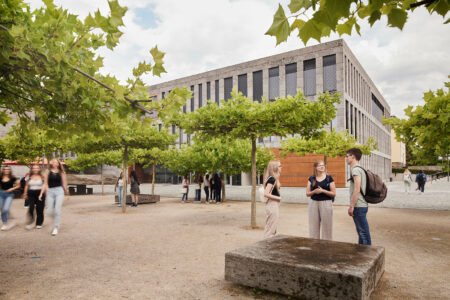For many, studying abroad is an investment in their future. It’s about gaining the skills and qualifications to secure a promising career. But, like any great opportunity, it comes with its challenges.
As international students face tighter visa policies and rising tuition fees, Germany offers a refreshing alternative. With an increasing number of English-taught programmes and an 18-month job search period after graduation, it’s quickly becoming a top destination for international students. Add to that Germany’s mix of exciting cities and great job opportunities post-graduation, and you have a destination that’s as enriching as it is budget-friendly.
Fulda University of Applied Sciences is a perfect example of this affordability with no compromise on quality. As it’s a public university, international students do not need to pay tuition fees. Instead, they work while studying and later pay taxes as graduates on a post-study work visa.

Fulda University’s campus – complete with a plane tree courtyard, sports centres, a garden, and more – is a great place for students to gather and relax. Source: Fulda University of Applied Sciences
Fulda University to great careers
At Fulda University, academic excellence meets real-world learning in a community that feels like home. Located in the centre of Germany in the east of Hesse, not far from Thuringia and Bavaria, this lively town may be small but it seemingly has it all: cultural charm, stunning green spaces, and easy access to major German cities.
This setting naturally draws a diverse community to Fulda University, with 2,200 international learners among its 9,000 students. Here, they pursue one of over 60 study programmes across six departments — from nutrition and health to social sciences, technology, business, and law — that prepare them to be in-demand graduates.
One example is the Data Science MSc led by Prof. Dr. Frank Klingert. “The programme supports German companies by addressing the high demand for data science expertise while benefiting from the research and practical experience of our colleagues,” he says. “Students gain hands-on experience through practical projects, and their master’s thesis can be linked to research or real-world projects in their specialised fields.”
If you’re interested in food science, Fulda University’s Food Technology programme is a great option. It’s one of the few programmes in Germany that covers a wide range of topics, from animal-based foods to preservation and microbiology. What makes it even better is that you won’t just be learning from textbooks; the programme includes practical, work-integrated learning (WIL). You’ll gain hands-on experience through an eight-week internship in the early semesters and a semester-long internship towards the end of your programme.
“The food industry today faces numerous challenges, such as a shortage of skilled workers, global competition, rising costs, and the impacts of climate change,” says Prof. Dr. Mamadou Diakité, Dean of the Department of Food Technology. “We directly address these challenges by equipping students with the skills and knowledge necessary to succeed in the modern food industry. Through laboratory work, pilot plant experiments, and industry placements, students gain practical experience while focusing on innovation, sustainability, and a global perspective.”
The Department of Food Technology has numerous partnerships with industry which provide crucial exposure to students. “One such collaboration is with the Antonius Foundation,” says Prof. Dr. Diakité. “Together, we’re developing plant-based alternatives, improving production processes, and navigating the complexities of supply chains. This work empowers our students to drive sustainability and resilience in the food system, positively impacting local communities and the global food industry.”

The Buddy Programme matches students by interests, offering a great chance to connect, help each other, and improve language skills. Source: Fulda University of Applied Sciences
Comprehensive support
On top of the university’s career-oriented education, Fulda University offers various services to enhance the employability of students and graduates. “One of our key initiatives is an annual career fair, where students can connect with potential employers from various industries, including food technology,” says Prof. Dr. Diakité. “Our career services team also assists with job searches, resume writing and interview preparation. Plus, through internships and industry partnerships, students build professional connections that often lead to job offers and long-term career opportunities.”
Another way Fulda University helps you grow academically and personally is through its extracurricular opportunities. Whether it’s IT Basics or how to launch a start-up, they focus on building soft skills and practical know-how to enhance your skillset further. The university’s language centre also offers workshops in both German and English to improve your language skills and help you effectively plan your academic journey.
Follow Fulda University on Facebook, Instagram, YouTube, and LinkedIn.











